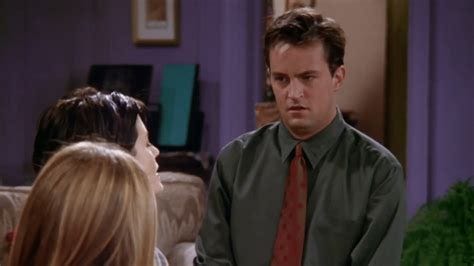I have been thinking a great deal recently, for reasons having tragically little to do with television, about what people do with their griefs small and large, how they uncork their pain and often rebottle it in the form of some person who reflects, honors, or offsets that sadness.
When the news broke that Matthew Perry had died, at the shockingly young age of 54, it took me a few hours to feel capable of shifting gears emotionally from the international to the American, from the collective to the personal, from the front pages to the entertainment section.
Having written a book about Friends, and come face to face with the depth of fans’ emotional attachment to the show, it hardly surprised me that so many people would feel such a way about Perry’s death, and yet I think it surprised many fans of the show who would not have anticipated how much they were affected by the death of an actor they did not personally know.
A huge portion of Friends’ appeal was the way in which it commingled comedy and soap opera, pulling viewers in with jokes and then keeping them around with the emotional nuance, not least the ten-season-long will-they-or-won’t-they between Ross and Rachel. It seems foolish to select a favorite performer or character from Friends, as so much of what made the show work the way it did was its chemistry, but I always had a soft spot for Matthew Perry as the actor with the most comedic chops.
Perry’s wizardry was satirized as a single vocal inflection (Could he be any funnier?), but as the show’s writers discovered, part of what the actor brought to the role of Chandler Bing was the desire to keep the audience on their toes. The writers would sometimes go so far as to underline particular words in a given line of dialogue, as if to say, please emphasize this word. Perry never would. He would always find a surprising way to deliver a line, discovering an approach that even the writers—who had often just pulled all-nighters writing those very lines—had not dreamt of.
When Marta Kauffman and David Crane first conceived of Chandler, he was an empty bowling shirt clad in zingers, and little more. He was intended to provide comic relief for the romantic intrigue (which was originally supposed to be between Monica and Joey, but that’s a story for another day). All Kauffman and Crane really had was a sense of how Chandler would sound, and the only actor they saw who could capture the music of Chandler’s voice was Matthew Perry, but he was already committed to a series about futuristic baggage handlers named LAX 2194. (No, I am not making this up. I am nowhere near clever to make that up.)
Kauffman and Crane resumed their search, and found to their dismay that no one could match what Perry had done. The only actor they liked was named Craig Bierko, whose rhythm came close to Perry’s. It was only later, after they had hired Perry, taking a risk that LAX 2194 was not long for the world, that they discovered that they liked Craig Bierko (who would go on to fame in series like UnREAL) because he had been tutored for the role by none other than Matthew Perry.
The magic of the Friends writers’ room was in the way these 20- and 30-something writers transformed their own deeply mundane experiences—I bought a pair of overpriced leather pants and now I regret it—into storylines for their characters. Of those characters, perhaps none was so close to many of their hearts as Chandler Bing, the slacker prince of the self-mocking one-liner transformed, slowly and movingly, into a loving family man. We invite the stars of the television series we love into our homes, there to walk with us through the hills and valleys of our lives, and who has ever been invited into more homes than Matthew Perry and his castmates? The grief is real. He was everyone’s friend.




It wasn't on long enough for me to be sure, but I understand, it didn't have the Sorkin magic. I refused to watch West Wing as it was just after Bush's stolen election. I didn't want to watch politics, it sickened me. We came upon Sports Night, which was sensational......years had gone by, so we went back and watched West Wing, wow, what a brilliant show......and Newsroom was as important a show as any we've seen in the last 25 years.....brilliant
While the ensemble was what made it work; Friends didn't have 2 stars with 3 supporting actors, there was something distinct about Matthew Perry, and hence, his character. Perry's bouts with substance abuse caused him to change physically from one season to another. As invested as we were in the character, and he WAS so sharp with those quips and the cadence, we were reminded on some level that this actor was having a hard time personally. (In fact, when they had the reunion, physically he was the most startling of the ensemble to view.) Loving Chandler Bing was also connecting with Matthew Perry, so unlike Schwimmer (so brilliant) and the others, I think we felt closer to Perry because we were not just rooting for Chandler, but rather, rooting for him to get his life together. (I'd be interested to know what you thought about the (unfortunately) aborted Studio 60 on the Sunset Strip, the Sorkin series, which had Perry in a superb cast...............we can discuss that show; I think its timing was unfortunate as it was competing with 30 Rock)................enjoy your writing, Saul.........................Barry